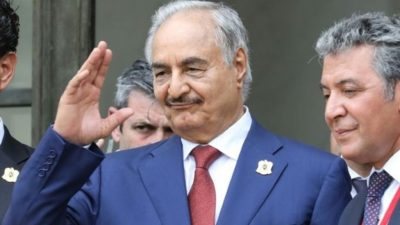General Haftar Is Trying to Trick Turkey into Overextending Itself in Libya

Libyan National Army leader General Haftar ordered his forces to attack Turkish ships and companies that he accused of helping the internationally recognized Government of National Accord, as well as to arrest Turkish citizens in the country, which is nothing short of an effort to trick Turkey into overextending itself by provoking it into “mission creep” so that it ends up trapped in the Libyan quagmire.
***
The Libyan Civil War might be entering a new phase if the forces led by Libyan National Army (LNA) leader General Haftar do good on their leader’s threats to attack Turkish ships and companies that he accused of helping the internationally recognized Government of National Accord (GNA), a well as to arrest Turkish citizens in the country. The popular warlord has already succeeded in capturing most of the country with the notable exception being the capital of Tripoli, which has only held out as long as it has supposedly because of Turkish support.
The Libyan Civil War was directly caused by NATO’s 2011 War on Libya and the subsequent scramble for influence in the energy-rich and geostrategically positioned North African state, with Turkey playing a leading role in the latter because the de-facto Muslim Brotherhood-led country envisions restoring its Ottoman-era empire through the establishment of ideologically allied governments in this vast trans-continental space. The GNA is comprised of Muslim Brotherhood fighters and their offshoots who came to power after 2011, which is why Erdogan supports them so strongly and has a stake in their continued leadership of the country, something that Haftar is adamantly opposed to because he sees his countrymen’s collaboration with Turkey as treasonous.
The LNA leader is now threatening to impose serious physical costs to Turkey’s unofficial intervention in the Libyan Civil War, hoping that this will either compel it to retreat or counterproductively dig in through “mission creep” and risk overextending itself in what has become a regional proxy war between secular and Islamist forces backed by the UAE/Egypt/France and Turkey/Qatar/Libya respectively. Nevertheless, Erdogan’s ego, his ambition for regional influence, and the domestic political pressure that he’s under after the latest mayoral election rerun in Istanbul are responsible for Turkey’s vow to retaliate against the Libyan warlord.
Should Turkey suffer highly publicized losses at the hands of Haftar’s forces, then it might embolden the country’s Cypriot, Greek, Kurdish separatist, and Syrian enemies in its immediate neighborhood if they interpret those developments as a sign of weakness proving that the Turkish military is just a “paper tiger” incapable of properly defending its interests and/or defeating its first conventional military adversary in decades. Erdogan is therefore in a classic dilemma since he’s damned if he retreats but equally damned if he doesn’t and ends up being humiliated by Haftar. It’ll remain to be seen what ultimately happens, but Turkey is in a very tricky position nowadays and needs to be careful that it doesn’t get trapped in the Libyan quagmire.
*
Note to readers: please click the share buttons above or below. Forward this article to your email lists. Crosspost on your blog site, internet forums. etc.
This article was originally published on Eurasia Future.
Andrew Korybko is an American Moscow-based political analyst specializing in the relationship between the US strategy in Afro-Eurasia, China’s One Belt One Road global vision of New Silk Road connectivity, and Hybrid Warfare. He is a frequent contributor to Global Research.

